December 2020 / More
Free Subscription NoticesKEEP THEM COMING If you're not seeing your TAT Forum new-issue email notices in your in-box, check your spam folder and other folders that your email client may be putting mail into. Gmail, for instance, now automatically places emails from Facebook, Twitter, or LinkedIn into the Social tab, while most email marketing campaigns find their way into the Promotions category. When you whitelist an email address in Gmail, this ensures the email shows up in your Primary Inbox rather than other tabs. You'll also get a notification on your device or desktop when you receive an email in your Primary Inbox, unlike emails that go into the Promotions category.
Whitelist an email sender in Gmail
Primary inbox vs. Social, Promotions, etc. => [I don't use Outlook or Yahoo mail, but here's what I've read about whitelisting with them. Please let me know if any of these examples are incorrect or outdated – Ed.]
Whitelist an email sender in Outlook:
Whitelist an email sender in Yahoo mail: |

Convictions & Concerns
TAT members share their personal convictions and/or concerns
Absorbing Conflict
From a November 2015 TAT presentation
Session Description for that TAT Gathering's Web Page:
We intuitively sense something deeper in life that is incessantly pulling at our attention. As seekers, we imagine that following a spiritual path will finally abolish all opposites and ultimately end all of life's conflicts. But what if cultivating "something deeper" led to a surprising twist? What if this cultivation actually expanded our perspective on opposites and increased our capacity to absorb conflict, both internally and externally?
In this session, we'll use the group's energy to maximize our discernment of opposites. Through a combination of interactive discussion, silence, and full group exercises, we'll attempt to cultivate something deeper and widen our perspectives. Paul will walk us through a few simple approaches that point us away from the world of paradox and toward what is.
Why I'm doing this
- Expressing my love for Truth (we are all prisms refracting the Light in our own way)
- Encouraging a deep exploration of body, mind, and Essence (Jacob's Ladder is a map)
- Spurring you to allow your own authenticity to blossom
- My commitment to simplify and share (Richard Rose made a commitment to share his findings)
- Establishing rapport and friendship with others. I don't feel as though I'm a teacher, but perhaps I can be a friend on the path....
Like all the other presenters, I'm not asking for anything or imposing anything on anyone.
The Subtractive Path (variations/terms)
- Retreat from error
- Erosion of ignorance
- Reverse vector
- Backing away from untruth
- Falling away of self
- Unknowing
Awakening to your true nature is the essential loss of the fear of death. It's a fundamental subtraction of everything. But for many, it takes time to lose the essential loss of the fear of love and life. And awakening is a great mystery that isn't totally solved: "There is a storehouse of information about the mind ... that is unplumbed." ~ Richard Rose
We're shifting the baseline of identity away from the mind's noise and into what is. It's a subtractive process. The noise consists of beliefs, emotions, conditioning, and self-referential thoughts—in particular the internal chatter of talking and hearing yourself, such as negative reactions, commenting, judging yourself and others, labeling, etc. Mostly, these thoughts have nothing to do with the true situation at hand. The noise captivates our attention. What's getting your attention? Or, what wants your attention and isn't getting it?
This isn't about polishing the small "s" self or obliterating the small "s" self. Any attempts at such obliteration would only result in an equal opposite force of resistance. It's about recognizing the small "s" self and alertly watching itself express in awareness. It's about shifting our attention from the noise and into awareness. Awareness is here now, and we can practice tuning into it.
Notice that I didn't say escape from or push away from the noise. Seekers often use their spiritual life to micromanage their life. For example, meditation is often misused in that way.
Richard Rose said that one of the truly remarkable aspects of his character was his capacity to absorb failure. As our awareness or capital "B" Being expands and comes to rest, our capacity to absorb more conflict (noise) is greater. And our Being can become an ocean inside and outside us that we live from!
As our Being-ness stabilizes, we can even bring the noise in close—it becomes a raw experience of what's happening internally, including all the thoughts, fears, and desires. It's an acceptance, but acceptance doesn't mean passivity or resigning ourselves to every demand of the body or mind (e.g., excessive sex, drugs, alcohol).
When you bring things into your awareness, life can become more painful for a while, but that pain has less of a grip (shorter in intensity and/or duration).
We can also absorb satisfaction. The spiritual path doesn't have to be morose.
Paradox
par·a·dox [par-uh-doks]
—noun
- a statement or proposition that seems self-contradictory or absurd but in reality expresses a possible truth.
- a self-contradictory and false proposition.
- any person, thing, or situation exhibiting an apparently contradictory nature.
These are some paradoxes that attracted my attention during 30 years or so of watching my mind. However, don't become paralyzed by paradox.
|
Pain The Path of Intellect/Knowledge Being somebody Losing the self Finding what you are Teacher as a crutch Boldness Resistance Not this Object My will/control/effort Movement Thought Form Consciousness Time Finite Everythingness |
Pleasure The Path of Heart/Feeling Being nobody Finding the Self Finding what you aren't Teacher as a helper Humility Acceptance This too Subject Thy will/trust/surrender ("let it be") Stillness No thought Emptiness Awareness Eternity Infinite Nothingness |
Triangle sketch: It's like watching a pendulum swing between two opposites, but from a more stable origin of where the pendulum swings. When spiritual seekers believe they should pursue either side of these paradigms, they subject themselves to more of a trap rather than the thing itself. We can get stuck—attached—if we believe that any point between and including the opposing points is where we should be. And we can get stuck if we become too attached to the observation point or use it to push away or disassociate from all the noise in the view.
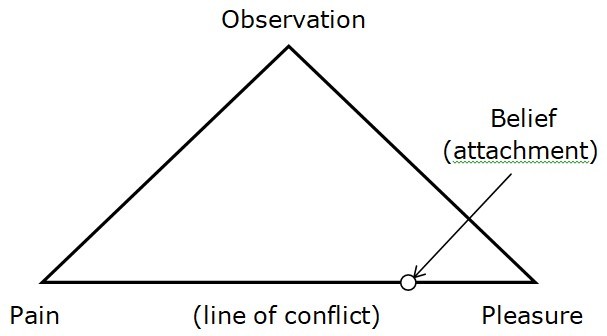
- We can become attached to anything on the baseline
- The baseline can look like the end of a spotlight by making it "3D"
- We can also become too detached (or attached) from the perspective of the observation point.
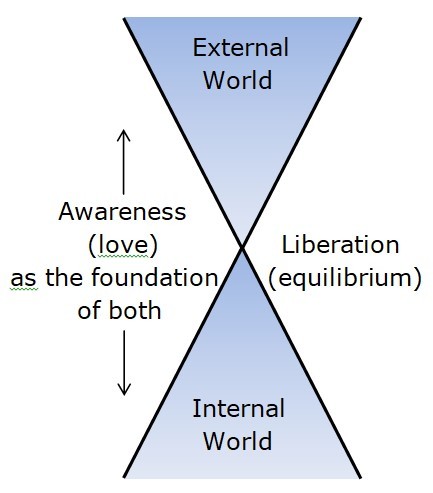
- Liberation is the equilibrium between our inner world and external world [we'll do some exercises to demonstrate this]
- We can absorb conflict by shifting into equilibrium between both worlds. Equilibrium is not rest; it isn't a bubble of safety.
Jacob's Ladder Diagram (from Psychology of the Observer by Richard Rose):
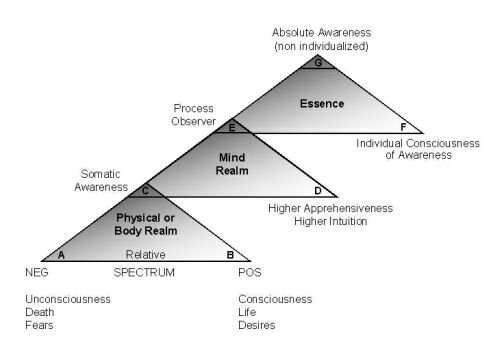
- The importance of body-mind-essence in both directions—balance
- TAT's new home should ideally include people who are versed in each of the three areas i.e., body: yoga teachers; mind: true psychologists; and Essence: spiritual teachers
- Discernment [the weekend theme] involves a deep awareness that we can get swept away in any of the three triangles.
Observations/Tips
- Remember (Richard Rose said the forgotten faculty of the mind is the ability of the mind to forget).
- Find your deepest anchor.
- Trust in it—align with it—allow life to unfold—let go of control. Notice the serendipity in your life—you'll start to notice it in real time.
- Use curiosity and your love of Truth rather than attempting to get an advantage over self, which is just the slippery devil self in another form—creates a split (Ego 1, Ego 2).
- Watch yourself being captivated by the noise (self-referential thoughts, beliefs, emotions, internal chatter, etc.), without resisting it or disassociating from it. But don't resign or become passive. It involves perseverance.
- No finish line (reverse vector continues). But the small "s" self does become more and more subtle as we continue down the spiritual path.
- Allow the internal "processor" to work off line. Use a daily practice (walking, sitting) and include reminders throughout the day to pause for just a minute and watch.
- Helpful seeker traits: deep self-honesty, gratitude, selflessness.
What's getting your attention?
*
~ Paul Constant has been a TAT member since 1985. His fascinations and explorations are directed toward integrating body, mind, and Essence through rapport. Read his essays at searchwithin.org, or listen to the SpiritualTeachers.org pocast interview with Shawn Nevins. Paul and his wife live in Pennsylvania. They were adopted by two kittens in 2013.
Return to the main page of the December 2020 TAT Forum.


TAT Foundation News
It's all about "ladder work" – helping and being helped
 Downloadable/rental versions of the Mister Rose video and of April TAT talks Remembering Your True Desire:
Downloadable/rental versions of the Mister Rose video and of April TAT talks Remembering Your True Desire:
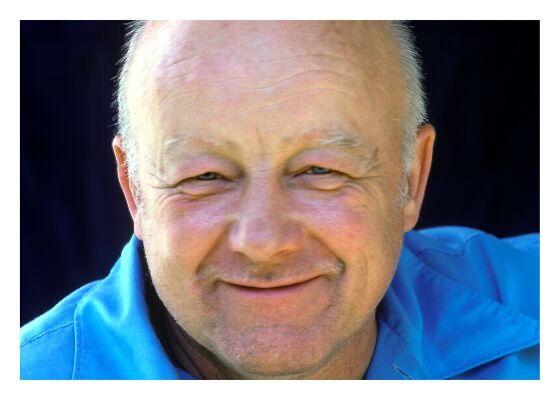
"You don't know anything until you know Everything...."
Mister Rose is an intimate look at a West Virginia native many people called a Zen Master because of the depth of his wisdom and the spiritual system he conveyed to his students. Profound and profane, Richard Rose was not the kind of man most people picture when they think of mystics or spiritual teachers. Yet, he was the truest of teachers, one who had "been there," one who had the cataclysmic experience of spiritual enlightenment.
Filmed in the spring of 1991, the extraordinary documentary follows Mr. Rose from a radio interview, to a university lecture and back to his farm, as he talks about his experience, his philosophy and the details of his life.
Whether you find him charming or offensive, fatherly or fearsome, you will not forget him, and never again will you think about yourself, reality, or life after death in quite the same way.
3+ hours total. Rent or buy at tatfoundation.vhx.tv/.
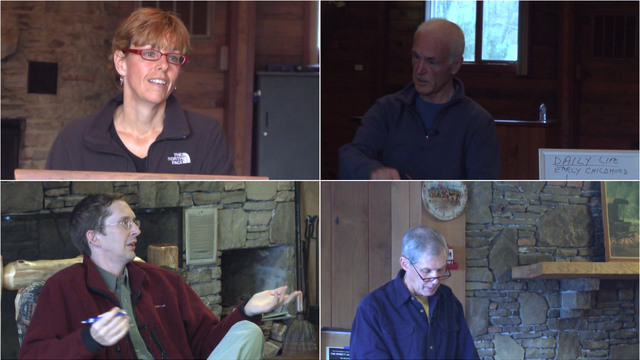
2012 April TAT Meeting – Remembering Your True Desire
Includes all the speakers from the April 2012 TAT meeting: Art Ticknor, Bob Fergeson, Shawn Nevins and Heather Saunders.
1) Remembering Your True Desire ... and Acting on It, by Art Ticknor
Spiritual action is like diving for the Pearl beyond Price. What do you do when you don't know what to do or how to do it? An informal discussion centered around the question: "What prevents effective spiritual action?"
2) Swimming in the Inner Ocean: Trips to the Beach, by Bob Fergeson
A discussion of the varied ways we can use in order to hear the voice of our inner ocean, the heart of our true desires.
3) A Wider and Wilder Vision, by Shawn Nevins
Notes on assumptions, beliefs, and perspectives that bind and free us.
4) Make Your Whole Life a Prayer, by Heather Saunders
An intriguing look into a feeling-oriented approach to life.
5+ hours total. Rent or buy at tatfoundation.vhx.tv/.
Return to the main page of the December 2020 TAT Forum.


Inspiration & Irritation
Irritation moves us; inspiration provides a direction
Energy and Tension
These are slides from a November 2020 TAT presentation of material from Richard Rose's Energy Transmutation, Between-ness and Transmission by TAT member Abhay V:
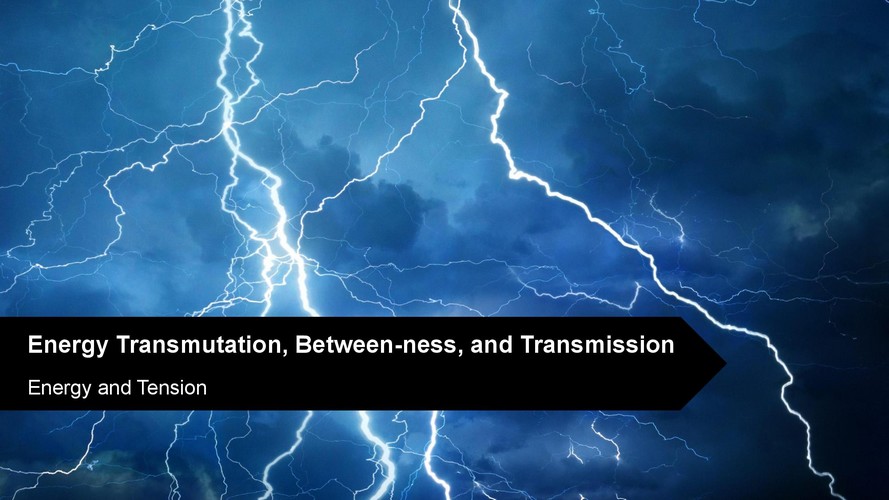
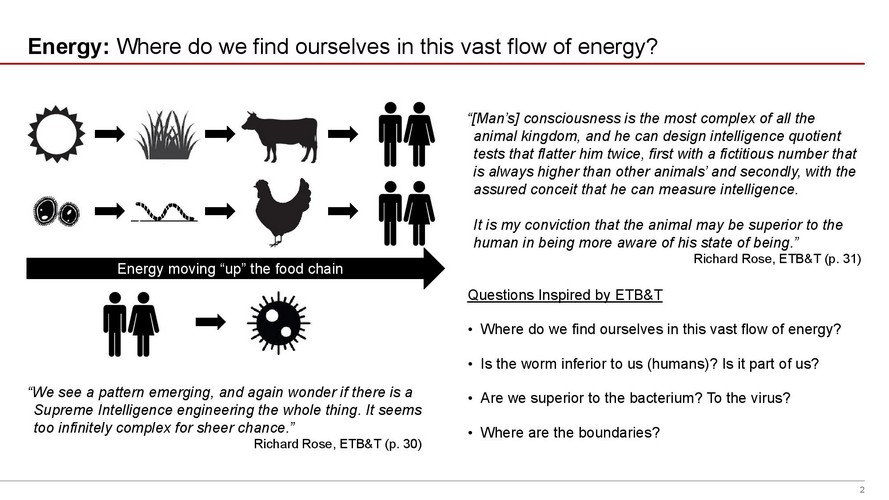
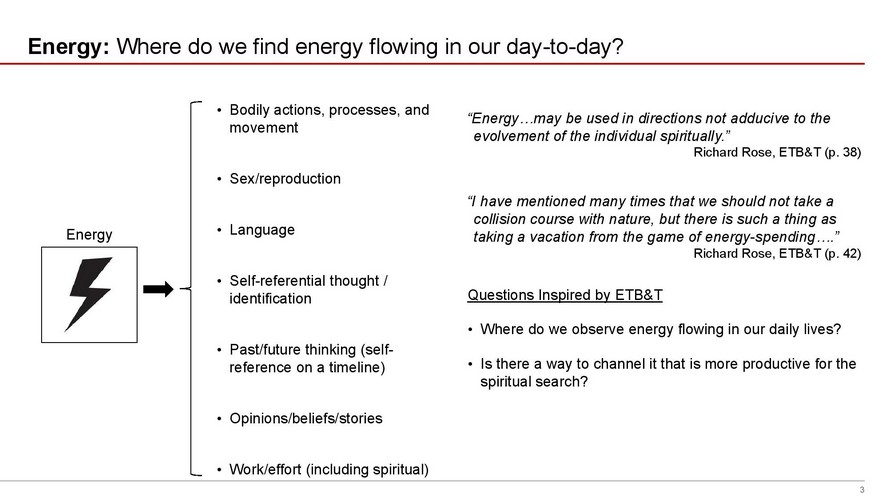
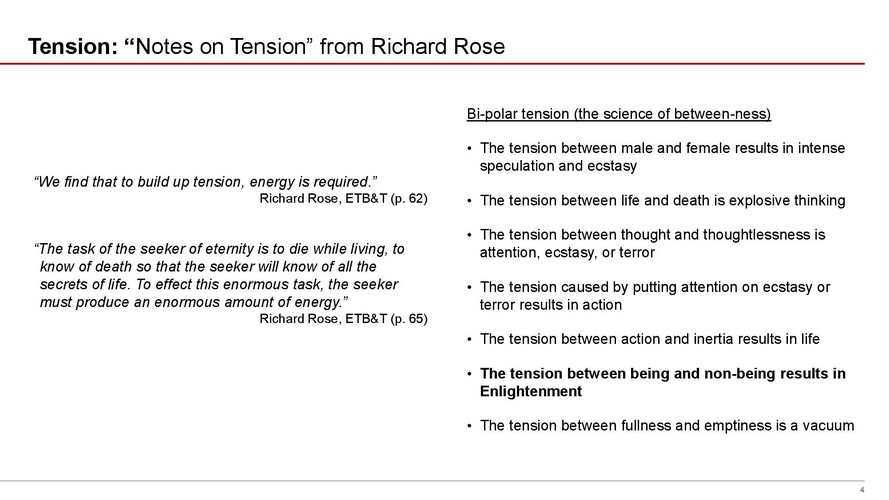
Return to the main page of the December 2020 TAT Forum.

Vector & Energy Transmutation
These are notes from a November 2020 TAT presentation of material from Richard Rose's Direct-Mind Experience by TAT member Bill K:
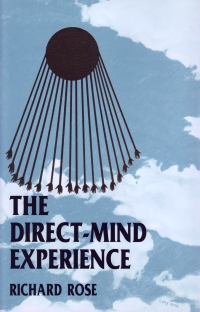
- Please note the image on the front cover, used in ancient Egypt by pharaoh Akhenaton, which Rose saw carved into a building during his visit to Egypt. At the top is represented the Absolute, God or Aten, and the bottom are individuals representing humankind.
- The Absolute is not represented as human or animal-like, but rather without anything suggested.
- Humanity is not represented as a whole or unity, but as individuals, not as hearts or faces but as hands. That could only refer to an ability to do something.
- There is a connection between the Absolute and the individuals, no direction indicated so as to suggest both directions possible, so that something could or does happen along that line.
- Rose suggests that this is the Ray of Creation but also the possibility or way back to our Source.
- He suggests re-traversing that through which we are manifested, and refers to it as creating a Reverse Vector.
- A vector is defined by its direction and intensity, and as a seeker we become a vector. Direction is away from untruths, self-deception and false beliefs, and the intensity is due to our personal commitment and intention to find the truth, both relative and eventually Absolute. Along this Ray we are initially motivated by determination, only to discover we are led.
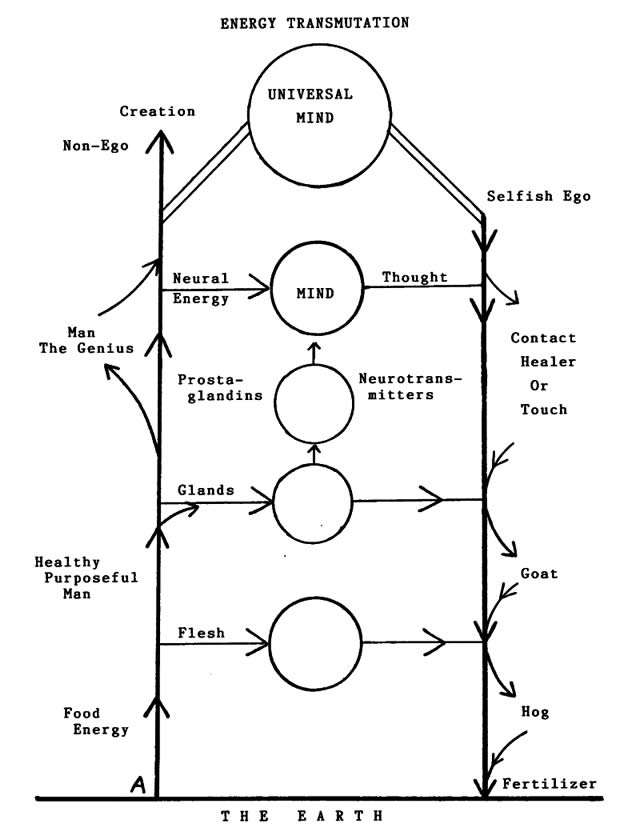
- Please note the chart © Richard Rose, which he sketched for "The Psychology of Miracles" 1981 talk in Akron, Ohio (page 189).
- The chart assumes transmutation or refinement of human energy along with a lot of other things in moving up the left side.
- This direction represents a progression in the refinement of human energy and in clarity in discernment, and more subtle opportunities referred to as "spiritual" for the seeker. But it also requires conservation of those more refined energies.
- Initially food is transmuted into physical or basic human energy; in turn some of that is refined into glandular energies for maintenance & repair of body, for growth and procreation; some of this energy can be transmuted into neural energy, the stuff that makes the evolution of civilization possible; note that this whole movement is a progression toward more subtle, refined and complex processes.
- A "seeker" up here on the chart is motivated by different energies at work compared to a "seeker" down here. The lower levels seek out desires of the flesh and glands—what Rose referred to as "barn-yard" motivations. The intentions of one higher up the chart are entirely different, and continue to change as this refinement progresses. The seeker changes or more correctly "becomes." His or her point of perception, clarity of discernment, types of desires and receptivity to any guidance, grace or influences are different from those of lower-level perspectives.
- The upward direction is that of the vector, and the intensity is the commitment and intention of the seeker—so much so that the seeker becomes the vector. The seeker changes as his attention faces in this direction and his energies change; his thinking, intuition and feelings become refined. The search becomes more subtle as it becomes refined.
- The further up the left side of the chart, the more subtle and ambiguous the search, unrecognizable to the previous levels or identity, but also receptive to more subtle influences. Note the transition toward the egoless vector.
Return to the main page of the December 2020 TAT Forum.

Self-Definition
These are slides from a November 2020 TAT presentation of material from Richard Rose's Direct-Mind Experience by TAT member Benjy H:
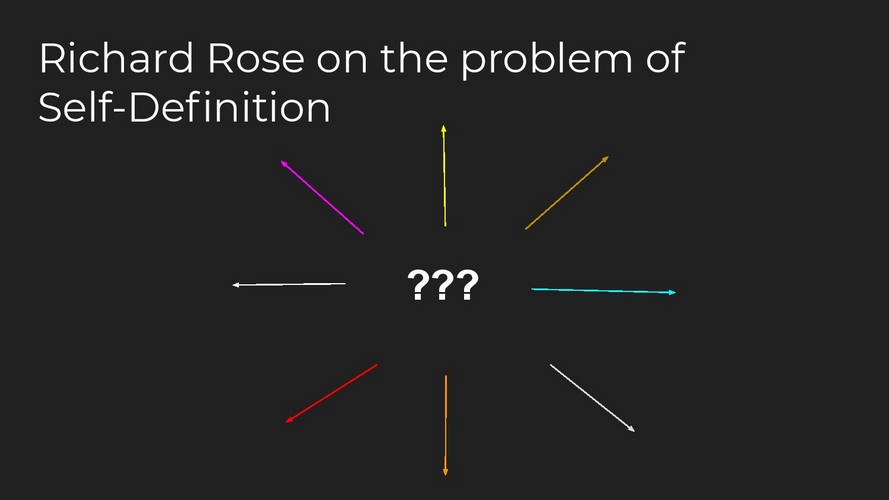
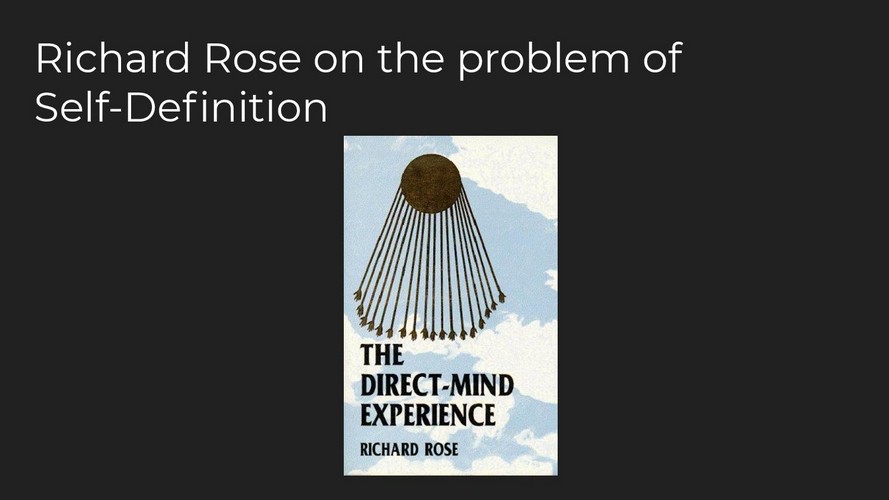
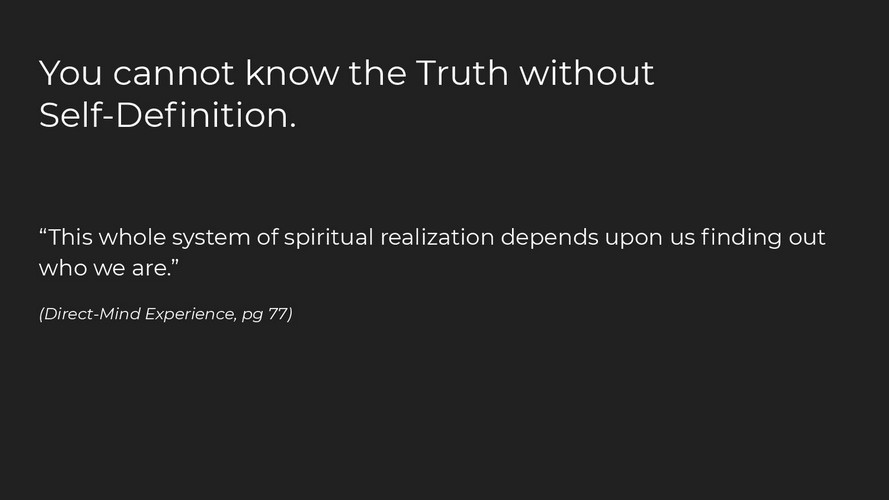
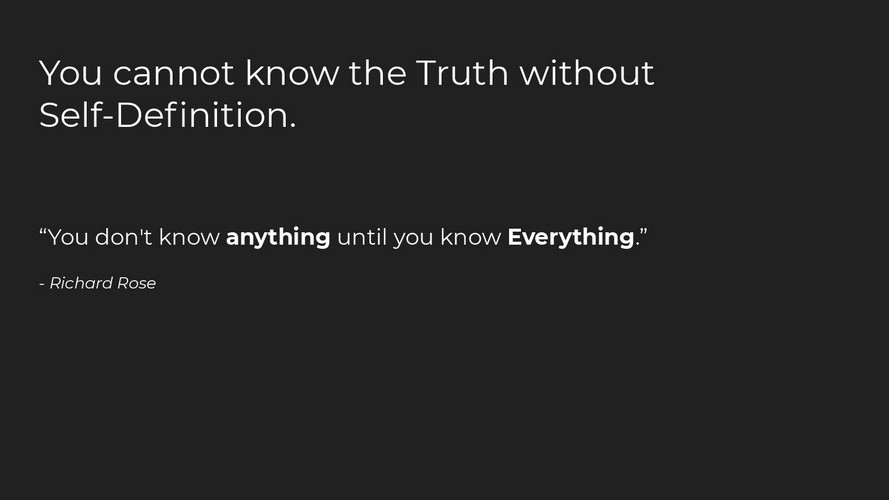
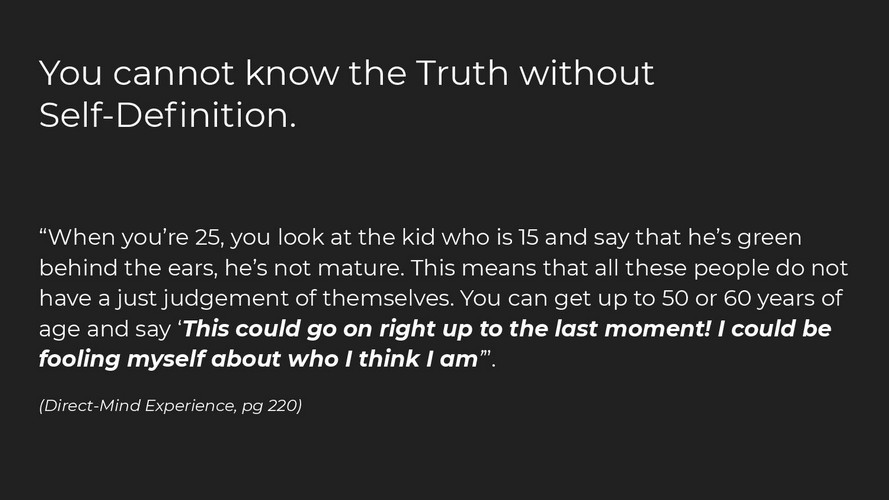
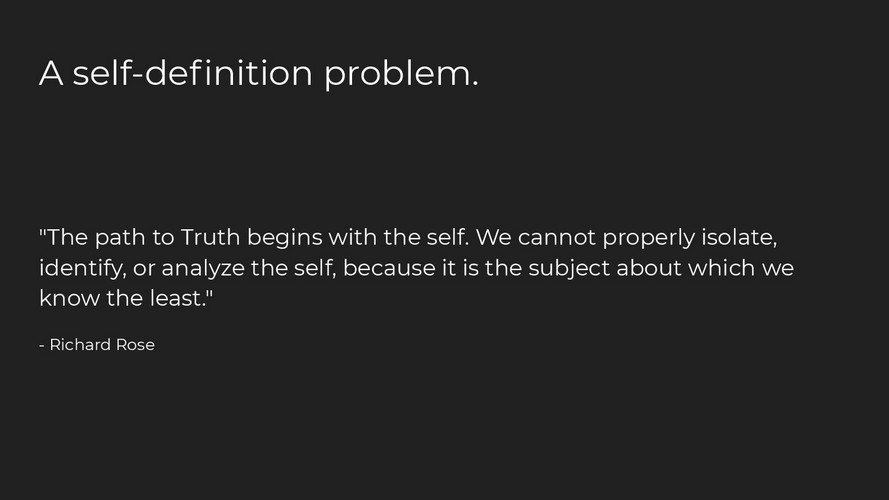
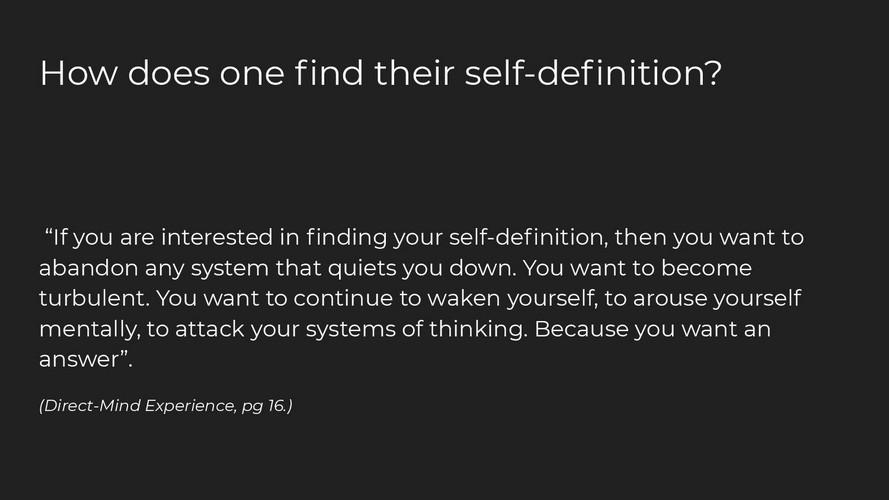
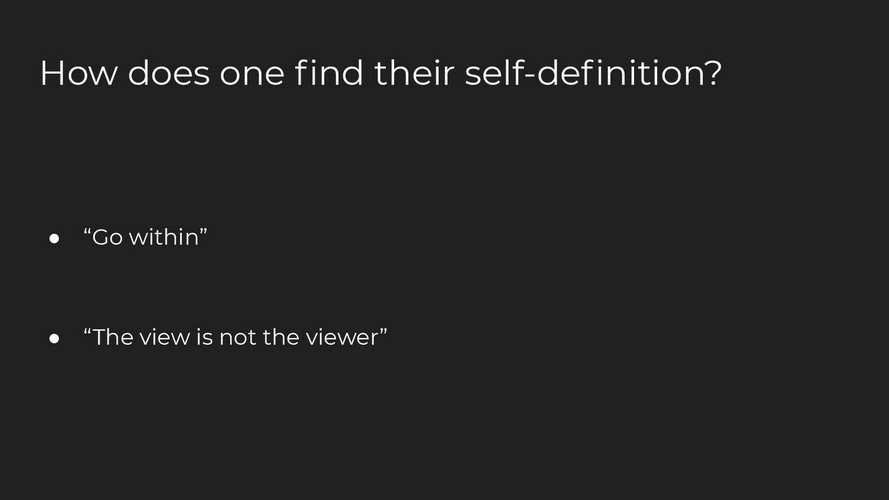
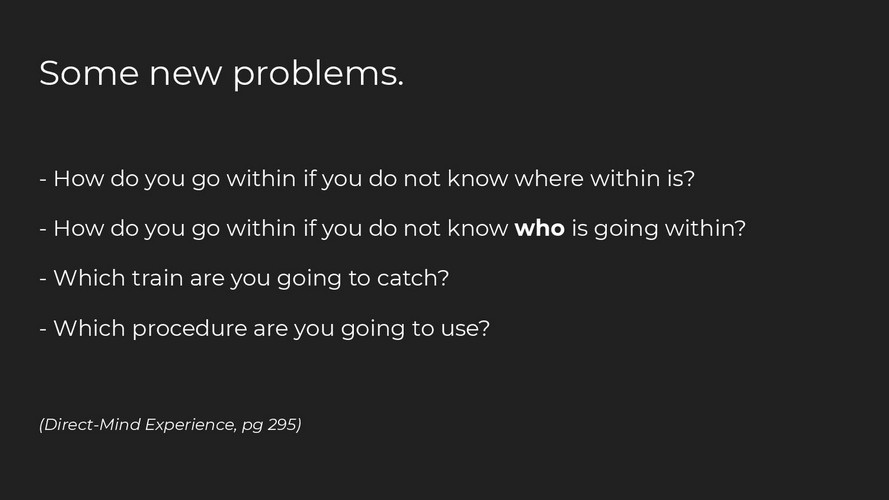
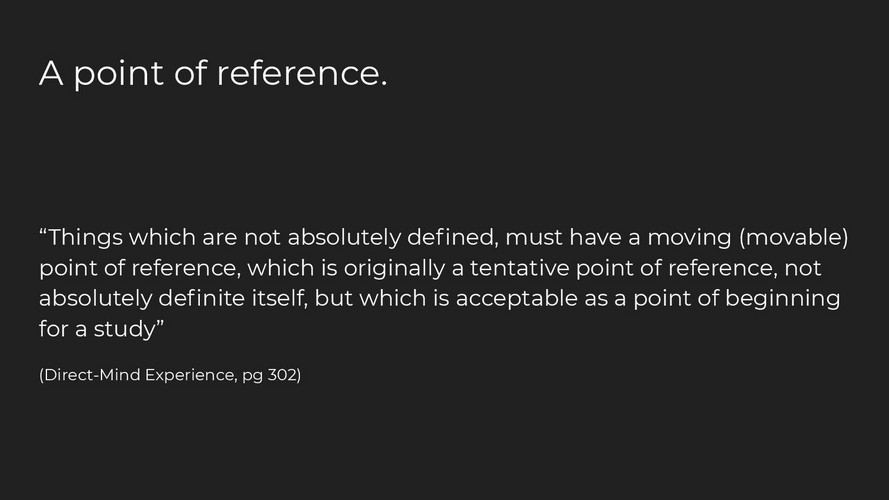
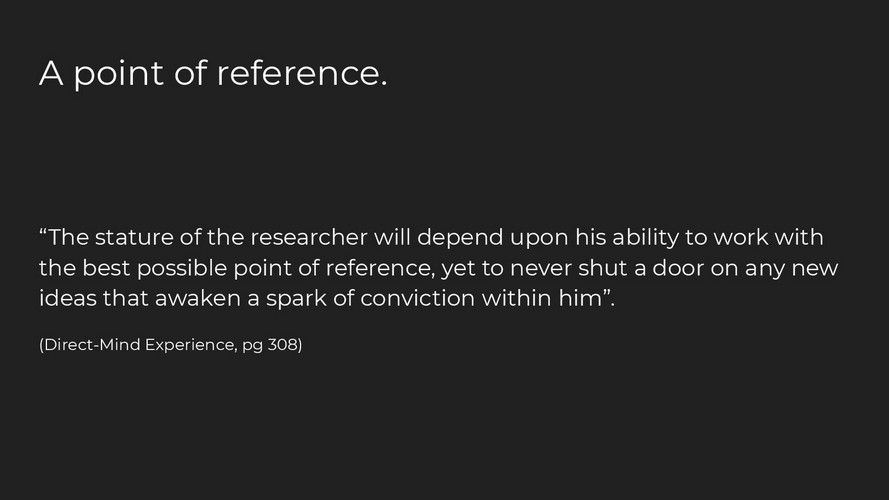
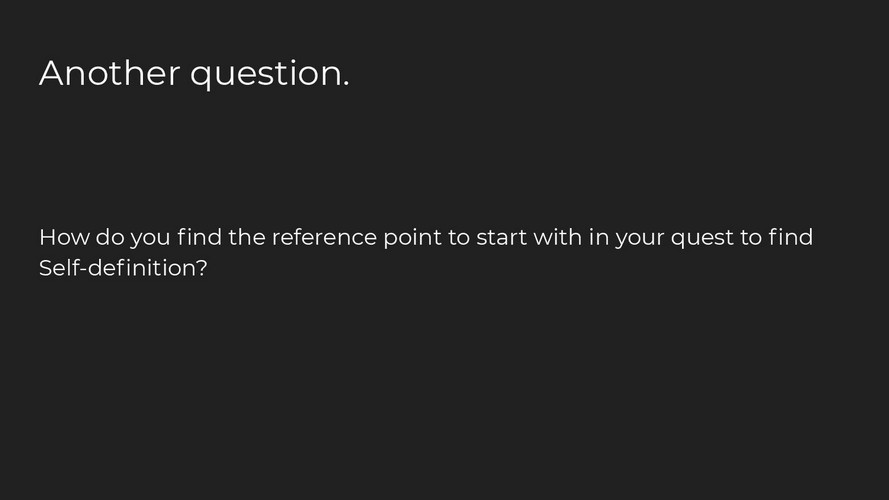
Return to the main page of the December 2020 TAT Forum.


Founder's Wisdom
Richard Rose (1917-2005) established the TAT Foundation
in 1973 to encourage people to work together on what
he considered to be the "grand project" of spiritual work.
He Found Meaning, Shares Experience
Pittsburgh Post-Gazette, November 19, 1977 by Bohdan Hodiak
Richard Rose spent more than 15 years obsessed with finding the meaning of life.
He studied to be a Catholic priest, traveled from one religious or esoteric group to another, read hundreds of books and meditated for an hour a day for 10 years.
“I realized there was no logical reason to believe I had a soul, was anybody or was going anywhere,” he said.
He was alone in Seattle, Wash., at the time, and as soon as he admitted his spiritual bankruptcy a kind of mental fever took hold that lasted for nearly two days.
He felt he was going insane.
Rose, now 60, said he still finds that experience difficult to describe, though he has tried in the final pages of his book, The Albigen Papers. The experience washed the despair out of him and gave him the conviction that his essence was immortal.
Yet there was no special feeling of joy or beauty. It seemed to transcend sensory feeling, he said.
“It was like a great wow, when everything seemed to answer itself.”
Rose returned to his family farm south of Wheeling, W.Va., married, raised three children, and held a variety of jobs. He had attended college for a while studying to be a teacher but dropped out during the Depression of the 1930s.
As he got older he wanted to help others who were starting on the same road he had taken years before. From his reading he could now give his experience a name: cosmic consciousness.1
He began to give lectures before Theosophical, Edgar Cayce and other religious groups. “It's a law of life that to get you have to give. You only learn by teaching and it reinvigorates you,” he said.
Rose had an appeal to young people and many asked him to speak at colleges. Out of this evolved the TAT Foundation (for Truth and Transmission) and the Zen study groups. The foundation now has some 175 members, mostly in the tri-state area and there are nearly a dozen study groups, mostly at colleges.
They don't study Zen Buddhism. The word Zen was chosen because it represents knowledge without dogma. “Zen is a language, a method of questioning your thinking,” Rose said. Its maverick quality also appealed to him. The title of his book is taken from the Albigenses, the medieval heretics of France persecuted by the Catholic Church.
At the University of Pittsburgh the study group meets at 7:30 p.m. Thursdays in Room 319 of the Student Union. A typical evening may be spent discussing a book by Carlos Castaneda or intelligence or breaking habits.
The TAT Foundation arranges seminars, issues a newsletter and provides a meeting place where persons of different training and education can exchange ideas. Scientifically oriented, foundation members have a special interest in the fringe areas of science, such as Kirlian photography, hypnotism, the effect of the mind on the body, and so on.
Last summer some 130 persons attended a two-day seminar on Rose's farm. A psychiatrist talked about dreams, Rose on hypnotism, an electrical engineer on Kirlian photography, a psychic on her experiences. A former IBM executive introduced the group to a value options card game he had created. Its purpose was to get people to examine their values.
Another two-day seminar will begin at 1 p.m. today at the Tonidale Restaurant in Oakdale. The topics include nutrition and longevity, astrology and prediction, mental concepts and clarity, and human identity. Next weekend there will be a national meeting of TAT members at Rose's farm.
A TAT group meets in Oakland, generally on the second and fourth Tuesdays of the month at University and City Ministries, 4401 Fifth Avenue. The mailing address is TAT, PO Box 63, McMechen, WV 26040.
Those who want a particular dogma or answers to specific questions from Rose will be disappointed.
“I don't like to pose as a teacher. You're going to do people more harm if you pose as a guru. You're going to try to take them down your set of railroad tracks,” he said.
“The only thing you can do is to encourage people. Everyone has a separate nature and a separate path. If you plague your computer (your mind) with enough questions, if you won't give up, the computer will summon the energy to produce some sort of answer,” Rose said. The answer can then be checked with persons of similar interest.
Rose admits that in the psychic field there are many charlatans. He has been at a number of séances where he knew if he put his arms around the “spirit” he could throw it out the window.
Photographs have been taken of the Indian rope trick where a boy climbs up a rope that seems suspended from the sky, and then disappears. The photographs showed there was no boy or rope, Rose said.
But the interesting question to study, he said, is how the fakir can apparently hypnotize a group of people into believing in the rope and boy.
Rose thinks very highly of Zen Buddhism and the Gurdjieff-Ouspensky system. Both try to shock people into an awareness of their true nature.
Spiritual understanding cannot be learned, Rose said. “You have to do it yourself. If you don't, you'll be mouthing somebody's dogma or psychology. The formula is very basic. Make a commitment, make a contract with yourself to be honest. Don't kid yourself. This is basically the study of truth, going to the truth of all things.
Rose said that truth cannot be approached directly. “We don't know what it is. The only way to approach truth is to retreat from the opposite,” he said.
A good way to sift out the phony cults, Rose said, is to avoid those that want money or emphasize ritual, buildings or dogma. It's not easy, he said, for “nearly all spiritual roads are false.”
The idea is to break through the primitive mind of habit, tradition, preconceptions. “I'm convinced man does not learn (in spiritual matters), man only becomes,” he said.

Footnotes:
1. Richard Rose came across the term "conscious consciousness" in a book with that title by Richard Maurice Bucke, who had researched the lives of people throughout history who had experienced transcendental forms of consciousness. Rose said that Bucke hadn't distinguished between his own type of realization and that of Walt Whitman's with a deeper form witnessed by some of the subjects ... the difference between what Ramana Maharshi labeled as kevala nirvikalpa samadhi and sahaja nirvikalpa samadhi. - Ed.
Return to the main page of the December 2020 TAT Forum.
Did you enjoy the Forum? Then buy the book!
Beyond Mind, Beyond Death
is available at Amazon.com.


